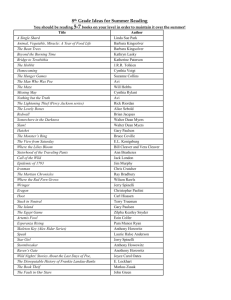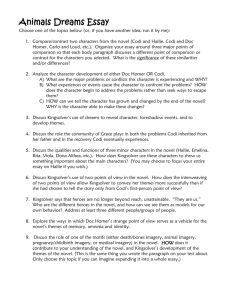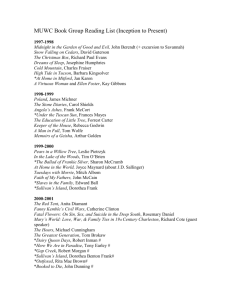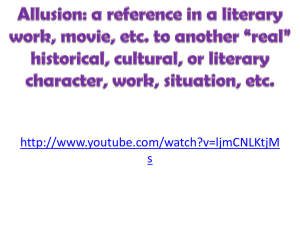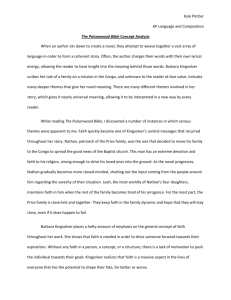Poisonwood Bible Allusions
advertisement
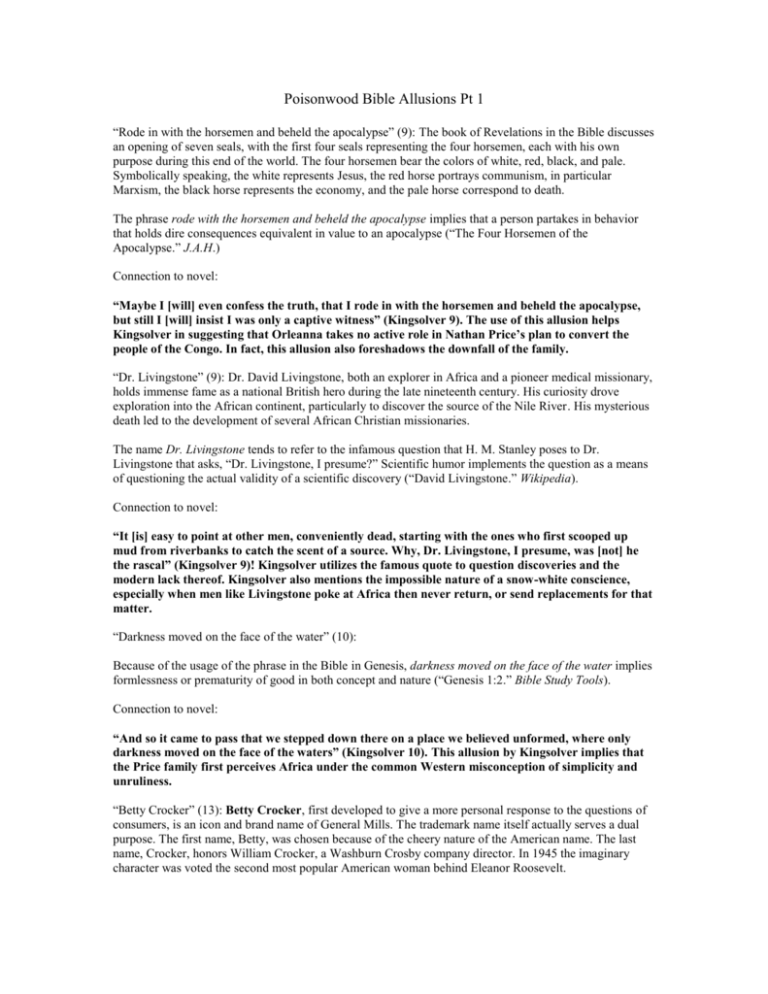
Poisonwood Bible Allusions Pt 1 “Rode in with the horsemen and beheld the apocalypse” (9): The book of Revelations in the Bible discusses an opening of seven seals, with the first four seals representing the four horsemen, each with his own purpose during this end of the world. The four horsemen bear the colors of white, red, black, and pale. Symbolically speaking, the white represents Jesus, the red horse portrays communism, in particular Marxism, the black horse represents the economy, and the pale horse correspond to death. The phrase rode with the horsemen and beheld the apocalypse implies that a person partakes in behavior that holds dire consequences equivalent in value to an apocalypse (“The Four Horsemen of the Apocalypse.” J.A.H.) Connection to novel: “Maybe I [will] even confess the truth, that I rode in with the horsemen and beheld the apocalypse, but still I [will] insist I was only a captive witness” (Kingsolver 9). The use of this allusion helps Kingsolver in suggesting that Orleanna takes no active role in Nathan Price’s plan to convert the people of the Congo. In fact, this allusion also foreshadows the downfall of the family. “Dr. Livingstone” (9): Dr. David Livingstone, both an explorer in Africa and a pioneer medical missionary, holds immense fame as a national British hero during the late nineteenth century. His curiosity drove exploration into the African continent, particularly to discover the source of the Nile River. His mysterious death led to the development of several African Christian missionaries. The name Dr. Livingstone tends to refer to the infamous question that H. M. Stanley poses to Dr. Livingstone that asks, “Dr. Livingstone, I presume?” Scientific humor implements the question as a means of questioning the actual validity of a scientific discovery (“David Livingstone.” Wikipedia). Connection to novel: “It [is] easy to point at other men, conveniently dead, starting with the ones who first scooped up mud from riverbanks to catch the scent of a source. Why, Dr. Livingstone, I presume, was [not] he the rascal” (Kingsolver 9)! Kingsolver utilizes the famous quote to question discoveries and the modern lack thereof. Kingsolver also mentions the impossible nature of a snow-white conscience, especially when men like Livingstone poke at Africa then never return, or send replacements for that matter. “Darkness moved on the face of the water” (10): Because of the usage of the phrase in the Bible in Genesis, darkness moved on the face of the water implies formlessness or prematurity of good in both concept and nature (“Genesis 1:2.” Bible Study Tools). Connection to novel: “And so it came to pass that we stepped down there on a place we believed unformed, where only darkness moved on the face of the waters” (Kingsolver 10). This allusion by Kingsolver implies that the Price family first perceives Africa under the common Western misconception of simplicity and unruliness. “Betty Crocker” (13): Betty Crocker, first developed to give a more personal response to the questions of consumers, is an icon and brand name of General Mills. The trademark name itself actually serves a dual purpose. The first name, Betty, was chosen because of the cheery nature of the American name. The last name, Crocker, honors William Crocker, a Washburn Crosby company director. In 1945 the imaginary character was voted the second most popular American woman behind Eleanor Roosevelt. The name Betty Crocker now represents an iconic American brand name since its growing popularity in the early 1900’s. The trademark epitomizes American food products (“Betty Crocker.” Wikipedia). Connection to novel: “We came from Bethlehem, Georgia, bearing Betty Crocker cake mixes into the jungle. My sisters and I were all counting on having one birthday apiece during our twelve-month mission” (Kingsolver 13). Kingsolver uses this allusion to illustrate the misconceptions that the Price family have of the Congolese jungle and their hopes of bringing their American lives safely with them. “Coin-jingling sinners” (13): In the Bible, the coin-jingling sinners are also known as the Sadducees, an ancient Jewish sect composed mainly of aristocrats that deny the resurrection of the dead, the existence of angels, and the validity of oral tradition. The Sadducees strongly opposed the Pharisees, another Jewish sect whose principles contradicted those of the Sadducees. The aristocratic Sadducees consistently attacked the Christian faith, let alone share their wealth with them. This behavior was thus considered sin. The phrase coin-jingling sinners has now entered the English language describing a selfish person who opposes several aspects of the Christian faith (“Literature as Narrative Ethic.” Hillinger) Connection to novel: “His tone implied that Mother failed to grasp our mission, and that her concern with Betty Crocker confederated her with the coin-jingling sinners who vexed Jesus till he pitched a fit and threw them out of church” (Kingsolver 13). The use of this allusion by Kingsolver helps to indirectly describe Nathan Price and how he not only possess a thorough knowledge of the Bible, but also upholds it. “Piggly Wiggly” (13): The Piggly Wiggly, founded in 1916, is a supermarket chain run by Piggly Wiggly LLC. The chain now operates throughout the Midwestern and Southern states. The opening of the store meant that it was the first self-service supermarket, and thus the first store to officially apply Clarence Saunder’s patented concept of self-service. The Piggly Wiggly supermarket pioneered several other concepts of moder-day grocery shopping, including a check-out stand and marking all items’ prices. The system that developed also called for brand recognition from companies, consequently creating another aspect of competition amongst the suppliers. The name Piggly Wiggly distinctly refers to a standard, American supermarket that provides self-service. The traditional qualities of the supermarket make it the perfect example of an American institution (“Piggly Wiggly.” Wikipedia). Connection to novel: “‘Where we are headed,’ he said, to make things perfectly clear, ‘not so much as a Piggly Wiggly’” (Kingsolver 13). This allusion by Kingsolver provides readers with insightful information about the Price family, specifically their background and the elements of society they consider normal and necessary. “Lilies of the field” (14): Jesus’ famous Sermon on the Mount, as described in the book of Matthew chapter five, states the Beatitudes. At one point, Jesus states that the people should not worry about clothing, stating that the lilies of the field do not work or spin, and that not even the great King Solomon dressed like the lilies. This particular message serves to take away the emphasis that human beings tend to place on clothing, both the acquiring of and the corresponding use of. The phrase, lilies of the field, refers to Jesus’ message about not worrying from His Sermon on the Mount. The meaning of the phrase mainly discusses clothing, and how people only control so much in their lives. (“The Rose of Sharon and the Lily of the Field.” Holy Land) Connection to novel: “Father surveyed our despair as if he [had] expected it all along, and left it up to the wife and daughters to sort out, suggesting only that we consider the lilies of the field, which have no need of a hand mirror or aspirin tablets” (Kingsolver 14). Kingsolver uses this allusion to again show that Nathan Price knows the Scripture well, and in the process indirectly states his opinion about the excess luggage. “Cross to bear” (16): In the Scripture, prior to His crucifixion, the guards force Jesus to drag His own cross up the hill on which he would be nailed to the cross. The cross itself is far larger than Jesus, and consequently proves to be an immense burden to carry. This act, however, symbolizes the far greater burden that Jesus carried: the sins of humanity. By dragging the cross to the hill, Jesus meant to also take with Him sin so that the salvation of the people would be possible. In the English language, if a person acquires a cross to bear, then that person has a heavy burden, responsibility, or problem that he or she alone holds the ability to cope with (“Idiom: Cross to bear.” Using English). Connection to novel: “Somewhere along about the Atlantic Ocean, the six pairs of underwear and cake mixes all commenced to be a considerable cross to bear” (Kingsolver 16). This allusion serves to assist Kingsolver in illustrating the unbearable nature of the flight for the Price family, as they attempt to bring their lives in Georgia to the jungles of the Congo. “Tribes of Ham” (20): Ham, one of the three sons of Noah, received a curse from his father after he saw Noah in all his nakedness, yet did nothing to solve the matter. Because his older brothers cover Noah without looking at him, they receive his blessings. Noah curses Ham and his descendants to be the servants of the people of his two brothers. Ham is then said to have moved into Africa and parts of the Middle East, thus making him the forefather of all people in these regions. The Tribes of Ham, in particular Ham himself, refers to not only the people of Africa and the Middle East, but also implies evil or a curse as a result of the actions of Ham (“Ham (son of Noah).” Wikipedia) Connection to novel: “God says the Africans are the Tribes of Ham. Ham was the worst one of Noah’s three boys: Shem, Ham, and Japheth” (Kingsolver 20). Kingsolver uses this allusion to set the foundation for the character of Ruth May Price, connecting Ham with Ruth and in the process describing Ruth as mischievous and also revealing her to be the youngest of the four daughters in the story. Ham bears a curse, which foreshadows a mishap for Ruth. “Moses tromping down off of Mount Syanide” (26): After Moses leads the Israelites out of Egypt, he brings them to the front of a mountain in the Desert of Sinai. He then ascends Mount Sinai while the people await his return, as well as the message from God. Ultimately the Israelites stray toward idolatry in Moses’ absence. After his descent, Moses sees the Israelites doing wrong and thus storms at the people with great fury. This results in the death of the Israelites who choose to worship the golden calf. The phrase “Moses tromping down off of Mount Sinai,” a deliberate misspelling by the author, characterizes situations in which sinners face the wrath of God, or the consequence of their sins for that matter (“Ten Commandments.” Wikipedia). Connection to novel: “He was getting that look he gets, oh boy, like Here comes Moses tromping down off of Mount Syanide with ten fresh ways to wreck your life” (Kingsolver 26). Kingsolver’s use of this allusion illustrates that Rachel opposes her father’s mission in the Congo and her lack of intellectual capacity. The allusion also implies that Rachel perceives the Congolese people as evil, and that her father represents Moses attempting to spread the laws of God within these people. “All the world’s a stage” (31): The opening line in the monologue of Shakespeare’s As You Like It, the phrase all the world’s a stage plays a role in the poet’s extended metaphor between life and a play. Shakespeare’s play also details the seven ages of man, starting with the infant stage and ending at sans everything. The phrase is Shakespeare’s most commonly quoted passage amongst his other works. The theatrical quote all the world’s a stage means that in life, people have roles to fulfill, and that all people first enter the world (born), take center stage (live life), and die (exit stage) (“All the world’s a stage…” The Phrase Finder). Connection to novel: “But no one here stays under a roof. It is in the front yards – all the world’s a stage of hard red dirt under bare foot – where tired thin women in every thinkable state of dress and disrepair poke sticks into their little fires and cook” (Kingsolver 31). On a simple level, the author makes use of this allusion to prove that Adah possesses a thorough knowledge of literature. On a bigger picture, however, the reader sees an image of life in the Congo through the eyes of an American girl. “Our Father” (32): In the Old Testament of the Bible, the text calls God Our Father, although with each instance comes a variation of the meaning based on the usage. More often Our Father appears in prayers and requests. The two words begin the Lord’s Prayer, which epitomizes the basic formatting of a prayer by one of the Christian faith. “Father” refers to God because in the Christian faith, believers represent His children. The phrase Our Father in the English language serves as a substitute for God (Father-God Language and Old Testament Allusions in James. Ester Yue). Connection to novel: “Our Father speaks for all of us, as far as I can see. And he is at the moment not saying much. His hammer turned out to be a waste of two or three good pounds, because there appear to be no nails in the mud-and-thatch town of Kilanga (Kingsolver 32). This allusion refers to both Nathan Price and God Himself, as Nathan’s work of trying to place nails in houses symbolizes God and the rate at which His Word is spreading in Kilanga. “Yes Jesus Loves Me” (34): Jesus Loves Me titles a popular Christian hymn that first gains its popularity after John F. Kennedy’s PT-109 boat crashes in the Solomon Islands. Two Islanders who come to the rescue of Kennedy and his men remember the melody of the song from a time when the Marines sang a similar song with natives, who learned the song from missionaries. Yes Jesus Loves Me, the chorus of the song as added by William B. Bradbury, remains the phrase by which the song rings in the memories of most. This chorus emphasizes the Christian belief that Jesus always supports His followers (“Jesus Loves Me” Wikipedia). Connection to novel: “She grew strong as I grew weak. (Yes! Jesus loves me!) And so it came to pass, in the Eden of our mother’s womb, I was cannibalized by my sister” (Kingsolver 34). Kingsolver throws in this allusion as situational irony, for the original connotation praises God, yet in this case Adah endures misfortune and states the chorus. The allusion also indirectly states Adah’s lack of support for God and consequently her father’s mission in the Congo. “In the beginning” (35): The first three words in the Bible, in the beginning, signify the beginning of life and the universe as in the Christian faith. The belief that God creates all aspects of life starting with the heavens and the earth, as noted in the biblical account of Genesis, still holds strong as a belief in Christianity today. The Jewish title of the book itself, Genesis, derives from this account. The grammar context of the first verse leaves room for little interpretation, regarding whether the heavens and the earth were creations of spontaneous creation, or whether they were merely formed from shapeless existence. Nevertheless, the first three words in the beginning remain sure in meaning. (“Genesis creation myth” Wikipedia). Connection to novel: “In the beginning my sisters bustled indoors, playing the role of mother’s helper with more enthusiasm than they’d ever shown for housework in all their born days. For one reason only: they were scared to set foot outside the house” (Kingsolver 35). This allusion helps Kingsolver to recap the events that recently occur, and show that the sisters show no initial interest in helping their father reach out to the Congolese people; instead they wish to help themselves to what they please. This allusion, however, foreshadows a change of heart in the daughters, or at least some of them.
